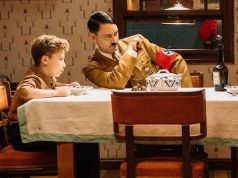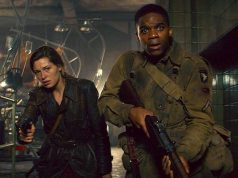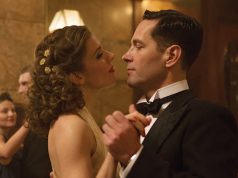With all the battles, victories, skirmishes and missions that have comprised America’s wars, Hollywood may never run out of stories to tell. But considering the nature of the most recent films — all the speechifying and cliches and self-importance of movies like “We Were Soldiers” and “Windtalkers” — I’m not sure an unlimited supply of source material is such a good thing.
Here is “The Great Raid,” filmed a few years ago and sitting on the shelf until now, when the impending Miramax/Disney split has prompted a rush to get all their jointly owned products into theaters or onto DVD. “The Great Raid” is not a bad movie, nor are its intentions anything less than noble. The event it addresses has not already been over-done by other films. But it still feels like countless movies before it, reliant on conventional war-movie devices and stock characters.
In January 1945, several hundred American POWs were liberated from Cabanatuan, one of Japan’s prison camps in the Philippines. These were the survivors of the Bataan Death March, of which you may have heard tell; Cabanatuan was where they were marching to, unaware that Japan’s official policy was that it would rather kill every POW than let even one escape.
Leading the prisoners is Maj. Daniel Gibson (Joseph Fiennes), who is dying of malaria while wallowing in love with Margaret Utinsky (Connie Nielsen), the widow of Gibson’s former fellow officer and now a figure in the Underground movement in Japan-occupied Manila. She sneaks quinine into the camp to help the soldiers, mostly unaware that her husband’s old friend has fallen for her.
Gibson has been warned by his Japanese jailers that if any one soldier attempts to escape, they will execute 10 more in his place. The Japanese know that in a few weeks’ time, they’ll have lost the war and the camp will be liberated anyway. Gibson is told to simply keep his soldiers quiet until then. What he doesn’t know is that Japan’s real plan is to kill them all before that time arrives.
Luckily, someone does know that. Lt. Col. Mucci (Benjamin Bratt) and Capt. Prince (James Franco), Rangers stationed not far from Cabanatuan, learn of Japan’s evil intent and set out to rescue the POWs before it’s too late.
It is Mucci who makes all the rousing speeches about glory, making history, and so forth, and all I can say is I’m glad the real Mucci was more inspiring than Benjamin Bratt is. His character is utterly without dimension, a trait unfortunately shared by most of these noble, beleaguered figures.
As directed by John Dahl, the raid itself is pretty impressive, bringing the intense excitement that would have served the rest of the movie well if it had been introduced earlier. As it stands, it is your standard war drama, with numerous story angles and character relationships set against the backdrop of a specific event. Men declare themselves to be beyond saving and urge their compatriots to go on without them; commanding officers insist that no one is going to die, not today; the Japanese are nameless, evil overlords.
To criticize a movie such as this, however gently, is to make oneself look like a cad, I know. How dare I diminish the suffering of those POWs! This was an important event in military history! Which indeed it was. All the more reason why it ought to be given grand cinematic treatment, not wasted on an effort that is, however well-intentioned, sub-par.
C+ (2 hrs., 13 min.; )





